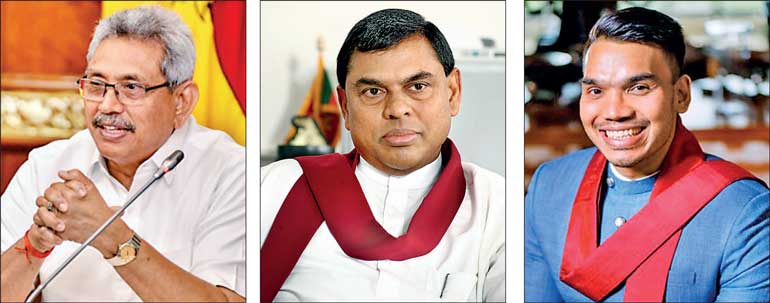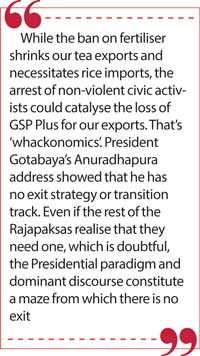Monday Feb 16, 2026
Monday Feb 16, 2026
Thursday, 1 July 2021 00:08 - - {{hitsCtrl.values.hits}}

BR’s organisational skills and NR’s ‘elan vital’ in politics will be pretty useless when Presidential policy has hollowed out the historic peasant base of the SLFP and its successor the SLPP, as well as of the Rajapaksas themselves—including in the south
 President Gotabaya is the Zero-Sum Man. When the President refuses to “take a step back” on the fertiliser issue, reiterating his public stand in conversation with the Mahanayakes, and the peasantry, filled with despair and outrage, step forward to demonstrate in their fields, villages and towns (e.g., Oruwala), the stage is set for collision.
President Gotabaya is the Zero-Sum Man. When the President refuses to “take a step back” on the fertiliser issue, reiterating his public stand in conversation with the Mahanayakes, and the peasantry, filled with despair and outrage, step forward to demonstrate in their fields, villages and towns (e.g., Oruwala), the stage is set for collision.
An entirely legitimate, peaceful ‘Govi (Peasant) Hartal’ is spontaneously swelling up from the grassroots or rather the paddy fields. If the Government cracks down violently as did the UNP in August 1953, it will end up just as that Government did in 1956.
All this could have been avoided. The betting in the media and the Opposition was that in his address to the nation on 25 June President Gotabaya Rajapaksa would show responsiveness to daily manifestations of public protest and social discontent on an array of issues. He would be smart, tactically flexible, make a mid-course correction. This would be a prelude to the induction of the pragmatic trouble-shooter and “managerial maestro” Basil Rajapaksa into Parliament and the Cabinet.
The President did the exact opposite. He stood inscrutable, immovable, and dogmatic. The key takeaway for me was the polarising maximalism of his speech; his unblinking rigidity with regard to the key socioeconomic issue of the day—one with wide electoral and social consequences—that of the ban on chemical fertiliser.
Learning from China: Failed
If President GR knew anything about the century-long history of the Communist Party of China he would know that its most outstanding leader and modern China’s founder Mao Zedong’s first political essay as a young Communist was ‘An Investigation into the Peasant Movement in Hunan,’ in which he hailed and urged the party to pivot towards the spontaneous peasant uprisings that had broken out against rural poverty and misery. “It’s fine!” he exulted. Unlike the Bolsheviks who were city-centric, the Chinese Communists championed the impoverished peasantry and ‘encircled the cities from the countryside’.
After the revolution it was Deng Hsiaoping and post-Deng leaders up to President Xi who made China’s peasantry prosperous. President Gotabaya is doing the opposite.
While the toughest-minded and most visionary of world leaders from Lenin to Ho Chi Minh retreated on ambitious policies when it came to issues of the peasantry and rural agriculture, President GR refused to readjust. He reiterated the correctness of his policy, ignored the peasant protests and scientists’ criticisms. Future historians will mark his myopically obdurate declaration that he would not “take back the step” as a turning point.
One may speculate on the reasons for the President’s lack of realism. It could be the same factor that accounted for President Trump’s conduct: playing to the hardcore base. But President GR was refusing to grant relief to the Sinhala-Buddhist rural ‘heartland’ which voted for him. He was playing not to the vote-base that elected him, which was preponderantly Mahinda Rajapaksa’s. He was, however, playing to his hardcore network.
The President wolf-whistled every Sinhala-Buddhist historicist, hegemonistic and Islamophobic note that his whistle had. For instance, his speech flagged “religious expansionism”. But that doesn’t rally a vast voter-base any more, only a nucleus. That nucleus is nowhere enough to maintain popularity—which requires the exercise of empathy, display of sensitivity to mass disaffection, and prompt relief of socioeconomic hardship. But President GR’s real ‘power bloc’—Praetorians plus Police State—is enough to maintain dominance, with hard-power substituting for soft power; coercion for consent, legality for legitimacy.
The President’s 25 June discourse suggests that he may play his last card of a new Constitution which declares Sri Lanka a ‘Sinhala-Buddhist state’. He risks the same mistake that Chile’s Augusto Pinochet made when he gambled on a referendum and lost, because the referendum turned into a protest vote on economic privation and lack of democracy. Losing the referendum was the beginning of Pinochet’s end.
The Gotabaya regime wields enormous hard power on the island. By contrast, after the 25 June speech, the regime has by contrast, rapidly dwindling soft power (and almost no reserves of it). The President has not really “learned the governance experience of the Communist Party of China”. Introduced by Chairman Mao, the CPC’s governance dictum is “the mass line”, summed up by him as “from the masses to the masses”. Going by the 25 June speech, President GR’s governance doctrine, by contrast, seems to be “from the ex-military to the masses”.
Basil boxed-in
There is much hope and hype in Government circles about the induction of Basil Rajapaksa. Unfortunately for BR though, his possible contribution, just as that of Namal, has been pre-emptively circumscribed, undermined and almost foreclosed by the rigidity of the policy paradigm and governance model of President Gotabaya.
Though BR may be conferred a handsomely padded portfolio, he will have to operate within the policy parameters that President GR restated at inordinate length before the nation on 25 June. That date was the last chance of a soft landing, and the chance was blown.
Both policy paradigm and governance model are dominated by President GR. When the policy paradigm and the governance model constitute an amalgam of the anomalous, the irrational and the extreme, the system experiences multiple dysfunctions and crises. Thus, the generalised failure.
The President’s 25 June speech was symbol and synthesis of that amalgam. There are three intertwined constituent components:
(A) Jathika Chinthanaya/Viyath Maga ultranationalist nativism (where the anti-science idea of rapid countrywide conversion to organic fertiliser originated).
(B) Hyper-securitisation/militarism/‘Police State’-ism.
(C) Port City driven ‘China Dream’ (the President’s rapturous description in his Anuradhapura address of a ‘steel building on two towers’ would doubtless have gratified the hard-pressed peasantry).
In the 1970s, Madam Sirimavo Bandaranaike headed a coalition which contained far more brilliant Ministers and officials than any team that can conceivably be assembled by the Rajapaksa regime: Dr. NM Perera, Dr. Colvin R de Silva, Pieter Keueneman, Felix Dias Bandaranaike, Leslie Goonewardene, Hector Abhayavardhana, Dharmasiri Pieris, Prof. H.A. De S. Gunasekara, Nihal Jayawickrema, Dr. Premadasa Udagama et al.
However, it failed utterly and was rejected conclusively by the people, despite the excuse of the OPEC oil price hike, the precursor of the COVID-19 card which President GR repeatedly played in his June speech. It is not that the voters did not know of the OPEC oil price hike; it is that they knew many things could be done much better, and also that the sacrifices were wildly unequal and unshared.
The Sirimavo Bandaranaike Government’s colossal failure as manifested in the UNP landslide of 1977 was not because of leftists in the Cabinet. Felix Dias Bandaranaike, representing the Right, took over Finance in 1975 and shifted policy, but it didn’t work. Nor was the problem an aversion to foreign investment. NM and Felix presented a Draft White Paper on Foreign Investment (1972) and a Foreign Investment Guarantee Law (1975).
The failure back then, as now, was rooted in a wrong macro-policy paradigm worsened by an oligarchic governance model. The policy paradigm was a closed, ‘import substitution’ economy, while the governance model was defined in the letters of resignation of Dr. N.M. Perera and T.B. Subasinghe as “an invisible government” and “extra-constitutional centres of power”. The governance model was the infamous family tree (“pavul gasa”) of the interlocking Bandaranaike-Ratwatte-Obeysekara clans. Today it’s a family forest; the only forest that’s flourishing.
The problem is way beyond BR’s economic management skills and NR’s ‘fast and furious’ drive. It is in the deeper domain of the political economy of development. To give just one example, the surplus for every real industrialisation comes from agriculture and the collapse of agrarian incomes and thus savings, will cripple any possibility of real development. Peasant disaffection combined with urban discontent due to scarcity and rising food prices, especially if met with repression, will generate the social instability that blows-up the pre-requisites for economic recovery, let alone takeoff.
BR’s organisational skills and NR’s ‘elan vital’ in politics will be pretty useless too when Presidential policy has hollowed out the historic peasant base of the SLFP and its successor the SLPP, as well as of the Rajapaksas themselves—including in the south.
 Whackonomics and Asela Sampath
Whackonomics and Asela Sampath
President Gotabaya and his confidants are oblivious of how the world economy works. They don’t care about the optics of brutally arresting a non-violent civic activist in a raid on his home (while the President’s speech was being telecast), in complete violation of due process, and having granted a presidential pardon to someone convicted (with the conviction upheld by the Supreme Court and the Court of Appeal) for murder.
While the ban on fertiliser shrinks our tea exports and necessitates rice imports, the arrest of non-violent civic activists could catalyse the loss of GSP Plus for our exports. That’s ‘whackonomics’.
President Gotabaya’s Anuradhapura address showed that he has no exit strategy or transition track. Even if the rest of the Rajapaksas realise that they need one, which is doubtful, the Presidential paradigm and dominant discourse constitute a maze from which there is no exit.
Ranil’s responsibility
From its inception over a year ago, this column has highlighted the threat of militarisation and militarism. As such I applaud former Prime Minister Ranil Wickremesinghe’s parliamentary speech on militarisation.
Going further, I regard the KDU Bill which takes the institution outside the purview of the UGC as dangerous exceptionalism; a pathway for the rearing of a new, quasi-militarised ruling stratum and generation infused with an authoritarian ethos. Who is to prevent the products of this non-civilian institution enjoying preference of placement in the state and private sectors?
That said, Ranil’s speech reeked of hypocrisy and deceit of the rankest kind. The Sri Lankan military and ex-military always stayed within the parameters of civilian democracy despite two civil wars and an external intervention. As Ranil can easily ascertain from former presidential candidate Field Marshal Fonseka, former Presidents Kumaratunga and Sirisena, and ex-Minister Champika Ranawaka, the cancer of ultranationalist-militarism grew within a certain generation of the Officer Corps of the wartime military precisely during, because of and as a reaction to the policies of Prime Minister Wickremesinghe in 2001-2003. They were:
(I) Appeasement of the enemy Velupillai Prabhakaran—even saving him from an LRRP hit on 20 December 2001 (documented by Sandhurst senior instructor Prof. Paul Moorcraft) which would have shortened the war and attendant suffering.
(II) Victimisation/persecution of the Sri Lankan military, including the arrest of Military Intelligence officers and exposing operatives and operations, overriding the pleas of Army Commander Lionel Balagalle.
Outing Wickremesinghe at a media briefing, Field Marshal Sarath Fonseka, war-winning Army Commander and current SJB Chairperson, disclosed: “I remember Mr. Wickremesinghe asking me to close down High Security Zones in 2002. I lodged a complaint against him to then President Chandrika Kumaratunga.” (Daily Mirror)
Ultranationalist-militarism developed its ‘GR project’ for durable socio-political dominance and power when Wickremesinghe’s minoritarian tilt and persecution of the wartime military was magnified during his Prime Ministership of 2015-2019, exemplified by the 2015 Geneva Resolution drafted by him, with its commitment to foreign judges and special counsel. The non-unitary constitutional draft was the second trigger.
Ranil is responsible for the backlash that spawned the matrix of the Gotabaya presidency/ultranationalist-militarism/the 20th amendment. No Ranil, no Gota, no militarisation/militarism.
 Threat to Lanka’s military
Threat to Lanka’s military
Unlike Ranil Wickremesinghe and neoliberal-democrats, I am concerned not only about the threat FROM militarisation/militarism but also the threat TO the Sri Lankan military. The latter comes from:
(A) The shared intra-regime assumption and uncontradicted unilateral assertion (by Minister Sarath Weerasekara for one) that the Indo-Sri Lanka Accord, its Annexures and Exchange of Letters are irrelevant, and
(B) The unwillingness or inability of President Gotabaya and his inner-circle to recognise and observe Indian/Indo-US red lines in the Indian Ocean region.
If India’s PM were to appoint a Special Envoy (as I suggested in a virtual discussion organised by Kolkata’s Tilottama Foundation) to curate the Indo-Sri Lanka Accord among other functions, any inadvertent crossing of red lines through ignorance can be avoided by clear, crisp, consistent communication with Sri Lanka’s current leadership.
President GR’s boosting of the China factor and the excessive reliance on it, may be a tactical or even a strategic asset but is a ‘grand strategic’ blunder. The USA is pushing back against China, which means a West-East movement crossing the Indian Ocean into the larger Indo-Pacific. Sri Lanka is, as Robert Kaplan said a decade back, in the centre of the Indian Ocean which will be the centre of the global contestation. Sri Lanka has, under the Gotabaya Government, been turned into a strategic partner and hub of China, the perceived threat.
The grand geostrategic contest apart, there is the ideological one. The USA has defined the struggle as one of democracy versus autocracy/authoritarianism. Sri Lanka under the Gotabaya Government is transitional to the latter, looking much more like Cambodia/Myanmar than South Korea/New Zealand.
Given the preponderant and growing influence of China on our island, Colombo’s profile has caught the attention of India as it looks to its strategic and security concerns in the Indian Ocean.
When the Quad, and now, increasingly NATO, pushback against China’s influence, Sri Lanka will appear on their radars as the main ally of China in the Indian Ocean.
The currents of Quad’s countermoves from West to East (USA vs China), East to West (Japan, Australia and unofficially South Korea vs China) and North to South (India securing its Southern flank and the Indian Ocean vis-a vis China) will inevitably crisscross on Sri Lanka which will find itself squeezed from West, East and North.
China’s influence in Sri Lanka, way outside East Asia, and unconnected by land route unlike Pakistan, makes Sri Lanka the weakest link in China’s strategic chain in the Indo-Pacific. To switch the metaphor, Sri Lanka would be low-hanging fruit for a US-led Quad counteroffensive aimed at rolling back and containing China.
Given the two-day visit of China’s Defence Minister this year, the Gotabaya regime and the Rajapaksa power-elite may expect China to qualitatively stiffen Sri Lanka’s defences or fantasise that China-Pakistan will deter/divert India on its Northern border if pressure is brought to bear on Colombo.
Any such regime fantasy places our military in the crosshairs because:
1. The US-India partnership disposes of the greatest aggregation of military power that the Indian Ocean region has ever seen. Sri Lanka has been positioned by President Gotabaya as the Indian Ocean partner of the great power, China, at the competing end of that aggregation of force.
2. Whatever China’s buildup (including reportedly in Bhutan) and potential moves on India’s Northern flank, Sri Lanka’s axiomatic geostrategic realities are extreme proximity to India, distance from China, and an island character which by definition is vulnerable to naval blockade.
3. The ‘theatre balance’ of military forces in the Indian Ocean region where Lanka is, will always contain a preponderance in favour of India (especially with, but even without the USA) which is so overwhelming as to neutralise any deterrent capacity the Gotabaya government may imagine it possesses courtesy of China.